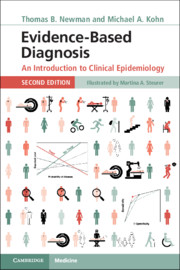Book contents
- Evidence-Based Diagnosis
- Evidence-Based Diagnosis
- Copyright page
- Dedication
- Contents
- Preface
- Acknowledgments
- Chapter 1 Introduction
- Chapter 2 Dichotomous Tests
- Chapter 3 Multilevel and Continuous Tests
- Chapter 4 Critical Appraisal of Studies of Diagnostic Test Accuracy
- Chapter 5 Reliability and Measurement Error
- Chapter 6 Risk Predictions
- Chapter 7 Multiple Tests and Multivariable Risk Models
- Chapter 8 Quantifying Treatment Effects Using Randomized Trials
- Chapter 9 Alternatives to Randomized Trials for Estimating Treatment Effects
- Chapter 10 Screening Tests
- Chapter 11 Understanding P-Values and Confidence Intervals
- Chapter 12 Challenges for Evidence-Based Diagnosis
- Answers to Problems
- Index
- References
Chapter 8 - Quantifying Treatment Effects Using Randomized Trials
Published online by Cambridge University Press: 02 May 2020
- Evidence-Based Diagnosis
- Evidence-Based Diagnosis
- Copyright page
- Dedication
- Contents
- Preface
- Acknowledgments
- Chapter 1 Introduction
- Chapter 2 Dichotomous Tests
- Chapter 3 Multilevel and Continuous Tests
- Chapter 4 Critical Appraisal of Studies of Diagnostic Test Accuracy
- Chapter 5 Reliability and Measurement Error
- Chapter 6 Risk Predictions
- Chapter 7 Multiple Tests and Multivariable Risk Models
- Chapter 8 Quantifying Treatment Effects Using Randomized Trials
- Chapter 9 Alternatives to Randomized Trials for Estimating Treatment Effects
- Chapter 10 Screening Tests
- Chapter 11 Understanding P-Values and Confidence Intervals
- Chapter 12 Challenges for Evidence-Based Diagnosis
- Answers to Problems
- Index
- References
Summary
As we noted in the Preface and Chapter 1, because the purpose of doing diagnostic tests is often to determine how to treat the patient, we may need to quantify the effects of treatment to decide whether to do a test. For example, if the treatment for a disease provides a dramatic benefit, we should have a lower threshold for testing for that disease than if the treatment is of marginal or unknown efficacy. In Chapters 2, 3, and 6, we showed how the expected benefit of testing depends on the treatment threshold probability (PTT = C/[C + B]) in addition to the prior probability and test characteristics. In this chapter, we discuss how to quantify the benefits and harms of treatments (which determine C and B) using the results of randomized trials. In Chapter 9, we will extend the discussion to observational studies of treatment efficacy; in Chapter 10, we will look at screening tests themselves as treatments and how to quantify their efficacy.
Information
- Type
- Chapter
- Information
- Evidence-Based DiagnosisAn Introduction to Clinical Epidemiology, pp. 205 - 230Publisher: Cambridge University PressPrint publication year: 2020
